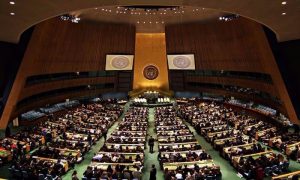In 1945, when the Soviets installed Kim Il-sung as putative head of the new country called North Korea, the former guerrilla presented himself to his people as a leader who would build up the nation as a fortress. North Korea would be racially pure and therefore superior to the mixed-race Muggles in South Korea and everywhere else. It would be impenetrable to imperialists, mostly because foreign entry would be restricted.
Now, 72 years later, and the idea of fortress nations seems to have become alarmingly popular in unexpected parts of the world. Consider the following:
US President Donald Trump’s senior aides want an annual cap on refugee entry of 15,000, which is approximately half the world’s daily number of new refugees. Trump has until October 1 to decide on the issue.
Leaked reports suggest the White House is being selective in its information-gathering process. It is said to have rejected an official study that said refugees earned the government billions more in revenues over the past decade than they cost. It is obvious that refugees have been added to an anti-immigrant agenda that is meant to secure the fortress nation.
Anti-immigrant parties are gaining support in Germany, which voted September 24; in Austria, which votes in October; and in Italy, which votes early next year. Only in Austria is there a real chance that rising hostility to foreigners, especially those from the Arab world, will propel the anti-migrant party into government. The conservative Austrian People’s Party, which shifted closer to the far-right Freedom Party’s positions on immigration and Islam, has maintained a poll lead in the four months since the election was called.
Finally, countries are defending their walled fortresses by any means possible. Extraordinary new deals are being done. Italy may be paying Libyan warlords to prevent migrants from setting sail in the central Mediterranean, the busiest route into Europe. The European Union is paying people traffickers in Niger to start other businesses, which don’t involve the dispatch of human beings.
The Italians deny a monetary arrangement with the warlords but it’s hard to understand why else the number of migrant arrivals from Libya would fall sharply the past two months. In July, arrivals in Italy were down 50%; in August, 85%.
If money is changing hands, it shouldn’t really be particularly shocking. Eighteen months ago, the European Union as a whole brokered a money-for-migrants deal with Turkey. Ankara was promised more than $7 billion to help pay for the upkeep of migrants intercepted on the Aegean Sea route to Europe.
That arrangement seems to have worked even though Turkish President Recep Tayyip Erdogan is routinely caustic about it. He complained to the UN General Assembly that Europe was stumping up less than it should.
In a way, Erdogan’s constant grousing pairs well with Trump’s eternal griping. Both seem to believe that a sharp-eyed, elbows-out and hostile world is taking advantage of their countries. However, their narrow self-focus merely illustrates the philosophy Trump has proposed as the guiding principle of global affairs.
He told the General Assembly that sovereignty should reign supreme rather than submission to global collectivism. Refugees, by extension, were cast in terms of a hopefully short-term affliction that is best quarantined in or near the refugees’ home countries.
“Are we still patriots?” the US president asked world leaders at the most multilateral institution on Earth. “Do we love our nations enough to protect their sovereignty and to take ownership of their futures?”
In real terms, that was a call to base nationalism, a nod to me-first transactional relationships rather than inspirational or aspirational shared values.
In a world of fortress nations, with severely circumscribed interests and mindsets, collective defence is a paradox and selflessness a sin.
We will all be North Korea by another name.


